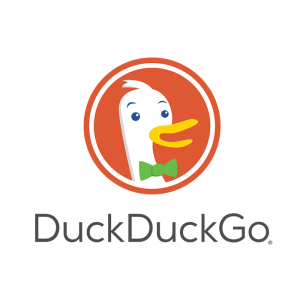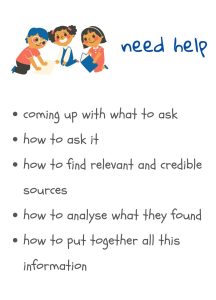Finding Information
7 Search Engines Part 1
Activity
Pick a search engine from the list below:

Bing OneSearch
Brave Qwant
DuckDuckGo Spotlight
Ecosia Startpage
Google Swisscows
MetaGer Yahoo!
- Are the search results as good as other engines you use regularly?
- What are the search engine’s sources? Is it dependent on other search engines for its results?
- Read the About us and Privacy Policy or Terms of Use pages.
- According to these pages, what does the company do with your data? Can you change the default privacy settings?
Once done, please have a look here for a brief description of each engine.
A search engine is the AI in your pocket. It is the most sophisticated use of Artificial Intelligence that most of us use regularly. The success of search engines is due to
- The explosion of content on the world wide web;
- A search engine’s capacity to make sense of this content and tag it for future searches (Indexing);
- Its capability to understand* what you are asking1;
- Its ability to show the most relevant content first (ranking).
AI algorithms power the three last factors.
Search engines – Knowledge Engines as some call them – have been successful in creating the illusion that everything in the world is on the web and that everything on the web is searchable2. This ready-to-serve knowledge, knowing and method of extending memory is transforming learning.
Search engines as learning and teaching tools
There are at least three ways in which search engines can help teachers and learners:
- Making it easy to find and verify information for use in lessons and tests. In this context, the meaning of information has undergone a big change in the last decade. As well as texts, audio, video, animation and even pieces of code are now easily accessible. So are search forums and digital repositories.
- Relieving the need for the teacher to be the sole source of knowledge. Teachers are now free to help hone skills, incite enquiry and resolve conflicts and doubts, if they so choose.
- Enabling students to do exploratory and project-based learning by opening up access to information. Students can access, sequence and derive their own meaning from information. This leads to learning that lasts and can be transferred to real-life situations3.
However, exploratory learning or any other kind of student led learning does not come easily. Students need help and scaffolding for many skills that go with searching for and putting together their own information sources3.
What to ask and how to ask it
 Various studies in Europe and further afield show that students struggle to search the web efficiently and effectively3. They often get frustrated when their search turns up nothing or do not know how to assess the relevance of search outcomes4. Younger children seem to have four distinct difficulties in searching for information on computers: creating search queries, selecting an appropriate website from a search list, spelling search terms correctly and understanding the language used in search results5.
Various studies in Europe and further afield show that students struggle to search the web efficiently and effectively3. They often get frustrated when their search turns up nothing or do not know how to assess the relevance of search outcomes4. Younger children seem to have four distinct difficulties in searching for information on computers: creating search queries, selecting an appropriate website from a search list, spelling search terms correctly and understanding the language used in search results5.
Knowing some searching techniques will go a long way in helping both you and your students use this incredible resource.
Optimising Search
- In a search engine of your choice, type search and look at the results. Compare them with the results of how to search or search tips. Now search for: how artificial intelligence is used in search engines?
- Compare the results of baked cheese recipes and “baked cheese” recipes. How can you know that searching for “East German” stories is better than East German stories without going beyond the first page of search results?
- Is Eat, Pray, Love the same as eat pray love?
- Try planet near jupiter. Find a restaurant close to the Eiffel Tower.
- What does artificial intelligence -“machine learning” do?
- What is the difference between the search queries “tom cruise” AND “john oliver” , and, “tom cruise” OR “john oliver”
- Compare the results of university of California and university of * California. What does * do?
- Try courses site bbc.com and courses site:bbc.com. Find courses in all websites that have a .edu web address(URL).
- Add filetype:pdf to any search query to learn its use.
Apart from practising good search techniques, it is always worthwhile to scroll down search results and check out pages beyond the first page. Search engines differ on how they rank results. The top results may not be based only on your search query and user activity. And not everyone knows how to write web pages that are optimised to show up in the top results.
To end our discussion here, please have a look at search settings, whatever search engine you like to use. They allow you to adjust how search results are shown and whether to set controls suitable for children, among other things.
Searching in pairs
Even after learning optimisation techniques, students may still have problems coining effective search terms and analysing the results. There is some evidence that searching in pairs or in groups of three can help. Discussing every step of an exercise can help students find better search strategies, correct the results and weigh what to do with the obtained information. Pairs may also be better at locating and judging information within sites when compared to individuals4.
* make sense of, understand, intelligent and other words are used in this text to describe the action of machines. It is important to bear in mind that machine based applications cannot make sense of or understand something in the same way humans do.
1 Russell, D., What Do You Need to Know to Use a Search Engine? Why We Still Need to Teach Research Skills, AI Magazine, 36(4), 2015
2 Hillis, K., Petit, M., Jarrett, K., Google and the culture of search, Routledge, 2013.
3 Marion Walton, M., Archer, A., The Web and information literacy: scaffolding the use of web sources in a project-based curriculum, British Journal of Educational Technology, Vol 35 No 2, 2004.
4 Lazonder, A., Do two heads search better than one? Effects of student collaboration on web search behaviour and search outcomes, British Journal of Educational Technology, Vol 36 Issue 3, 2005.
5 Vanderschantz, N., Hinze, A., Cunningham, S., “Sometimes the internet reads the question wrong”: Children’s search strategies & difficulties, Proceedings of the American Society for Information Science and Technology, Vol 51, Issue 1, 2014.
